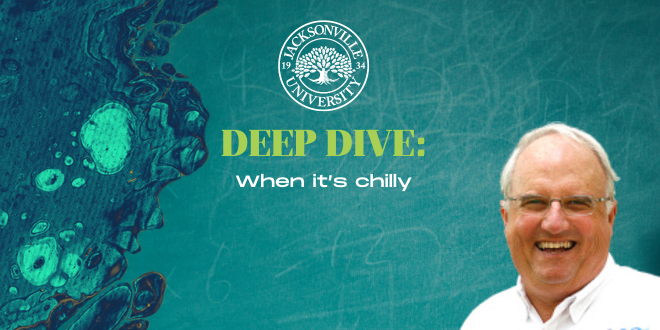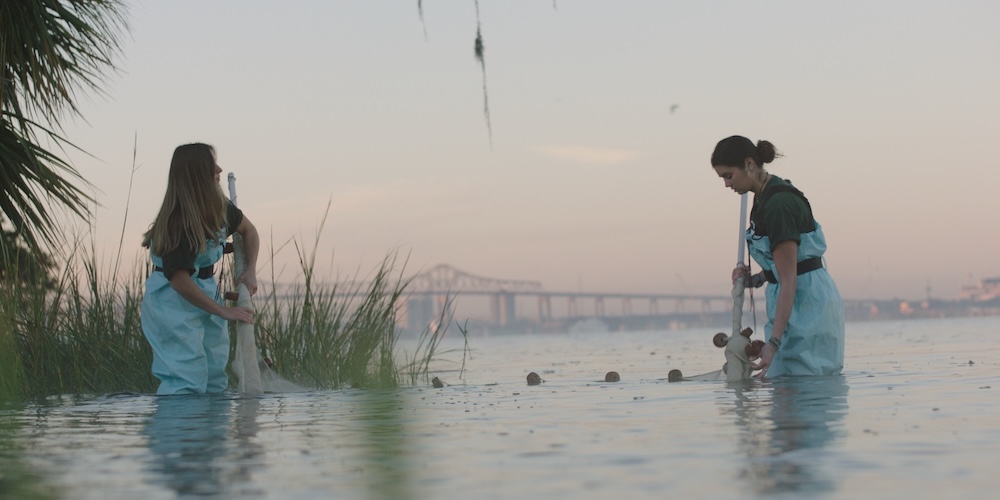This has been a fairly mild winter thus far. But you never know what January and February will bring. The St Johns River reflects the seasonal temperature fluctuations that we see in the air, but the change is more gradual. Water has what is termed high heat capacity, which means it takes more energy to increase its temperature than the air above it. So, temperatures can change rapidly in the air, but water will take longer to warm or cool.
Water also feels colder to our touch than air since it conducts energy nine times faster than air. Air has an insulating capacity whereas water quickly absorbs energy. It is why you feel cold in 72 degree water but are comfortable at that same air temperature.
Water temperatures within the St Johns River can reach well over 90 degrees during the summer and this past summer we saw temperatures exceed 100 degrees in southern Florida. Likewise, during the winter we can see water temperatures typically drop to the low 60’s and go even lower when we have sustained cold weather. Here in northeast Florida, we don’t typically see prolonged temperatures below freezing for more than a few hours.
Water temperatures are extremely important to most river life. Most animals are what is termed poikilotherms, which comes from the Greek, with poikilos meaning changeable or various, and therme meaning heat or temperature. Their internal body temperature reflects the ambient conditions surrounding them. The term “cold-blooded” is used to describe these animals, but that is sort of a misnomer since hot and cold are relative terms.
We, as mammals, are termed homeotherms with homo derived from the Greek homoios meaning same or similar. We have the same internal temperature regardless of the ambient or surrounding temperature. Homeothermic animals are also termed “warm-blooded” which is indicative of the typically higher internal body temperature than the surrounding environment.
So why does it matter? An organism’s physiology, or bodily processes, are nothing more than a complex series of chemical reactions. It’s a little demoralizing to think that we are nothing more than a sack of chemicals, but that, in its simplest form, is all that we are. And those chemical reactions are temperature dependent. As temperatures go up, so does the rate of the reactions.
Life requires that there be a balance in the rate of those reactions. If it is too warm or cold, then that balance is upset. When it gets too far out of balance, life cannot be sustained. So what do poikilothermic river animals do to maintain that balance? Sometimes they, mostly fish and even manatees, migrate to warmer water. Sometimes they, shrimp and crabs, burrow into the mud. Some fish or manatees may seek warmer pockets of water. In some cases they, like attached oysters and barnacles that cannot move, have evolved to survive by becoming dormant, slowing down their physiology to survive colder temperatures.
Technology has allowed scientists and others interested in things like water temperature or river flow rate to monitor them remotely, and to receive alerts on their phones based on certain conditions. I happen to get alerts for water temperature. My interest is related to manatee survival. Manatees cannot survive very long in water below 68 degrees and while most manatees leave the area during winter, a few remain and are susceptible to cold-stress and eventually death.
Warm-blooded animals, like manatees and even humans, are suspectable to cold temperatures, too. Our ability to maintain our internal temperature is limited. Manatees do not have the thick blubber layer of other marine mammals despite their appearance. So bundle up and stay warm, and if you are a manatee, find a Florida Spring where the water is always 72 degrees.
Glad you asked River Life
Does the term homo mean different things depending on when it is used? In biology we use the term homo in two distinct ways. It is a homonym. In Greek it
means “same” but in Latin homo means “man” or “human.” So, depending on the derivation
of the word, it can have very different meanings.



